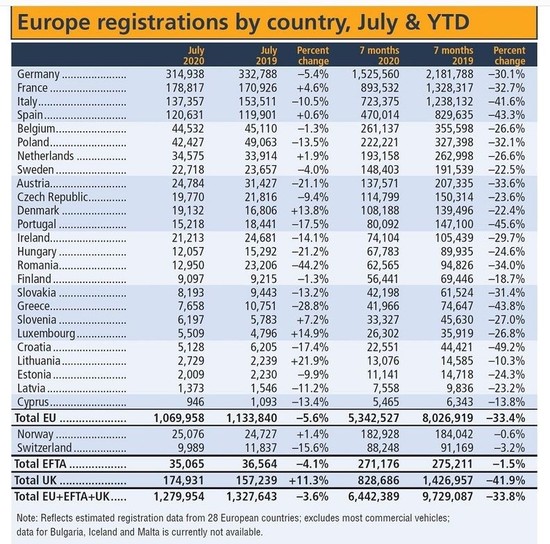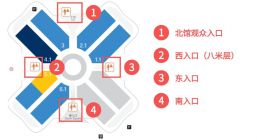The rebound in the UK market and the recovery in the French market narrowed the decline in European new car sales to below 4% in July. Data show that the number of car registrations in the EU, the United Kingdom and the European Free Trade Association (EFTA) member states in July fell 3.6% year-on-year to 1.28 million; in the first half of this year, the cumulative number of registrations in the above-mentioned market was 6,442,400, a year-on-year decrease of 33.8%. The agency predicts that the number of car registrations in the EU this year will be reduced by more than 3 million, to 9.6 million-this will be the lowest new car sales since 2013.
In July, sales of luxury brand cars in the European market mostly showed an upward trend. Among them, Mercedes-Benz remained firmly in the top spot, with sales increasing by 4.2% year-on-year to 79,000 vehicles; BMW brand registrations increased by 19% year-on-year to 72,000 vehicles, surpassing Audi to rank second, and the latter fell by 7.7% to 64,000 vehicles . Among the remaining luxury brands, Land Rover brand sales increased by 5.8% year-on-year, Jaguar decreased by 22%, and Lexus increased slightly by 3%.
The rebound in the UK market and the recovery in the French market narrowed the decline in European new car sales to below 4% in July. This is the smallest drop since January this year, and it is also the first single-digit drop since countries began to implement lockdowns due to the new crown epidemic. According to data from the market research company JATO Dynamics, the number of car registrations in the EU, the United Kingdom and the European Free Trade Association (EFTA) member states in July fell 3.6% year-on-year to 1.28 million; in the first half of this year, the cumulative number of registrations in the above-mentioned markets was 6,442,400. A year-on-year decrease of 33.8%.

Compared with the double-digit decline in previous months, this decline has improved significantly. According to data from the trade association ACEA, the number of new car registrations in the European market in June dropped by 24% year-on-year; in May this year, the number was 57%; in April, at the peak of the government's mandatory shutdown, car dealers were forced to temporarily close. New car registrations dropped by 80% year-on-year; registrations in March fell by 53%. In addition, before the outbreak of the epidemic, car sales in Europe had already begun to weaken. Car sales in this market in January and February fell by 7.6% and 6.9% year-on-year, respectively.
The British auto market achieved positive growth for the first time this year in July, becoming the biggest driving factor for the stabilization of the European auto market. After the previous ban on sales was relaxed, July became the first full exhibition hall opening month since the outbreak in the UK. The number of new car registrations increased by 11% year-on-year to 175,000. Other data showed that the total car production in the UK in July was 85,696, an increase of 51% over June, but there was still a 21% drop compared to July last year.
Mike Hawes, Chief Executive Officer of the Association of British Automobile Manufacturers (SMMT), said: "With the recovery of major global markets and the gradual resumption of operations in British auto factories, these data have improved significantly over the previous three months, but the outlook There is still a lot of uncertainty."
With the help of the government's incentive measures to deal with the economic crisis brought about by the new crown virus, the number of new car registrations in France increased by 4.6% year-on-year in July to 179,000. The used car scrapping program, which ended on July 31, has provided a single subsidy of up to 5,000 euros for approximately 200,000 transactions.
In addition, in Germany, Europe's largest auto market, vehicle sales in July fell 5.4% year-on-year to 315,000 vehicles; the Italian market fell 11% year-on-year to 137,000 vehicles; the Spanish market was 121,000 vehicles, basically the same as the same period last year.
Among European automobile groups, PSA Group performed the worst, with July sales falling 16% year-on-year. Among them, although the Peugeot brand has a 1.5% growth, it is not enough to offset the 35% decline of Opel and Vauxhall, and the 17% decline of Citroen.
Volkswagen Group registered a smaller decline in July, 4.4%. Among them, Skoda brand increased by 7% year-on-year, Audi brand decreased by 7.7% year-on-year, Seat and Volkswagen brand decreased by 17% and 6% respectively. In terms of models, the eighth-generation Golf returned to the top of the list after a lapse of two months, becoming the best-selling model in the European market in July with sales of 31,148 units; among the top 5 sales list, there is also Skoda Octavia (Skoda Octavia) Tiguan and Volkswagen took third and fourth places respectively.
As for the FCA Group, sales in July fell by 6% year-on-year. Fiat brand sales were flat in the same period last year, Alfa Romeo registered a year-on-year decline of 25%, Lancia and Jeep were down 16% and 18%.
In terms of brand growth, the Renault brand registered the largest increase in July, at 24%; followed by BMW and Mini, both with an increase of close to 20%; Kia and Volvo’s sales increased by 13% and 9% respectively.
Among the remaining brands, Ford's sales fell by 5% year-on-year, and Dacia's sales fell by 13%; Kia's sales increased by 13%, and Hyundai's sales fell by 7.2% year-on-year. Under this trend, Kia once again surpassed its sister brands. In addition, Toyota’s registration volume was basically the same as that of the same period last year. Sales of Nissan, Suzuki, Honda, and Mazda all declined, with Suzuki falling the most, reaching 36%, while Nissan, Honda, and Mazda fell 8.7%, 2.6% and respectively. 16%; Mitsubishi rose 4.1%
It is worth mentioning that most of the sales of luxury brand cars in the European market showed an increase in July. Among them, Mercedes-Benz remained the champion, with sales increasing by 4.2% year-on-year to 79,000 vehicles; BMW brand registrations increased by 19% year-on-year to 72,000 vehicles, surpassing Audi to rank second, which fell 7.7% to 64,000 vehicles. Among the remaining luxury brands, Land Rover brand sales increased by 5.8% year-on-year, Jaguar decreased by 22%, and Lexus increased slightly by 3%.
In the view of the European Automobile Manufacturers Association (ACEA), despite the stabilization of the auto market in July, the number of car registrations in the EU this year will still drop by more than 3 million units to 9.6 million units-this will be the lowest new car sales since 2013 Of the year.
AMS2024 Exhibition Guide | Comprehensive Exhibition Guide, Don't Miss the Exciting Events Online and Offline
Notice on Holding the Rui'an Promotion Conference for the 2025 China (Rui'an) International Automobile and Motorcycle Parts Exhibition
On September 5th, we invite you to join us at the Wenzhou Auto Parts Exhibition on a journey to trace the origin of the Auto Parts City, as per the invitation from the purchaser!
Hot Booking | AAPEX 2024- Professional Exhibition Channel for Entering the North American Auto Parts Market
The wind is just right, Qianchuan Hui! Looking forward to working with you at the 2024 Wenzhou Auto Parts Exhibition and composing a new chapter!
Live up to Shaohua | Wenzhou Auto Parts Exhibition, these wonderful moments are worth remembering!
Free support line!
Email Support!
Working Days/Hours!





